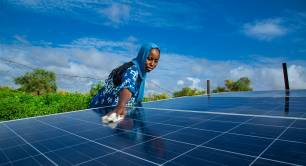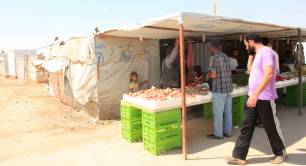COP26: BlackRock announces $673m climate fund as Fink urges ‘fair and just transition’
Public and private sectors must work together to ensure the transition to net zero does not unfairly exclude emerging countries, BlackRock CEO Larry Fink said on Tuesday.
Fink was speaking at this week's Green Horizon Summit as BlackRock – the largest asset manager in the world – announced it had raised $673m for the Climate Finance Partnership, a new infrastructure fund to finance projects tackling climate change in emerging markets.
The fund is backed by government-owned development banks from France, Germany and Japan which have provided first-loss capital to catalyse private investment.
It requires a lot of public investing alongside private investing. And I don't see that happening enough
The Climate Finance Partnership was “a great example” of the role public capital could play to mobilise much more private investment, Fink said.
He added that state-backed lenders as well as institutions such as the World Bank and the IMF should play a bigger role in providing first-loss capital for investments in emerging countries, which many private investors found too risky. There was a “huge amount of private capital” ready to be mobilised if the first-loss risk was mitigated, he added.
Risk of polarisation
Fink said a technological breakthrough was needed to meet net-zero targets, something that could be achieved if the public and private sectors teamed up, as demonstrated by the quick development of a vaccine against Covid-19.
“We have to have the same intensity, and we're going to have those breakthroughs,” Fink said. “But it requires a lot of public investing alongside private investing. And I don't see that happening enough.”
He warned the route to net zero should not be detrimental for emerging countries, which are currently highly reliant on fossil fuels and don’t have the means to pay for a carbon premium.
If we're not getting a fair and just transition, we're going to create more polarisation and more political uncertainty
To avoid this, de-carbonisation should be seen as mitigating demand rather than supply, Fink insisted. Lowering oil, gas and coal supply in a world that is still heavily reliant on fossil fuels, as is the case now, would only raise energy prices – which would unfairly impact the poorest people on the planet.
Instead, the world needed to develop the technology required to lower reliance on fossil fuels before squeezing production or hiking carbon prices, Fink explained.
“We need a fair and just transition,” Fink said. “If we're not getting a fair and just transition, we're going to create more polarisation in the world and more political uncertainty.” In those circumstances, the emerging world would simply not be able to afford a transition to net zero, he added.
Likewise, divesting from publicly-listed oil companies wasn’t necessarily a good solution as long as demand was high, Fink argued. As the production of European and North American oil companies was shrinking due to under-investment, demand was shifting towards Russia, Iran or Saudi Arabia. “That doesn't change the net zero world at all,” he said.
Fink, whose annual letter to CEOs this year focused on climate risk, said he understood the concerns of green activists and agreed that time was running out. But, he said, for asset managers such as Blackrock, educating and informing clients so they make climate-minded investments would not happen overnight.
The pathway to net zero would not switch “from brown to green”, but would go through many shades. “It is a process, and that requires planning, or we're going to have this imbalance and this unfairness.”
Thanks for reading our stories. As an entrepreneur or investor yourself, you'll know that producing quality work doesn't come free. We rely on our subscribers to sustain our journalism – so if you think it's worth having an independent, specialist media platform that covers social enterprise stories, please consider subscribing. You'll also be buying social: Pioneers Post is a social enterprise itself, reinvesting all our profits into helping you do good business, better.




